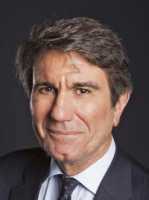29 May SUNSET Trial Supports Bronchodilators as Foundation of COPD Therapy
MedicalResearch.com Interview with:
Kenneth R. Chapman, MD MSc FRCPC FACP
FCCP, FERS
Director, Asthma & Airway Centre, University Health Network,
Professor of Medicine, University of Toronto,
GSK-CIHR Research Chair in Respiratory Health Care Delivery,
Toronto, Ontario
MedicalResearch.com: What is the background for this study? What are the main findings?
Response: Guidelines regard inhaled bronchodilators as foundational pharmacotherapy in COPD while inhaled corticosteroids are to be used sparingly. Inhaled corticosteroids are used to reduce exacerbation tendency but come with the added risk of pneumonia, osteoporosis and other corticosteroid related adverse effects. Although only a minority of COPD patients are exacerbation prone, many patients with COPD are treated unnecessarily with inhaled corticosteroids alongside long-acting anticholinergic and beta2 agonist bronchodilators – so-called “triple therapy”. In patients who have minimal exacerbation histories, inhaled corticosteroid withdrawal is suggested to reduce side-effects.
Although studies have suggested this is a reasonable strategy, study limitations have been noted. The best known inhaled corticosteroid withdrawal study, the WISDOM trial, recruited only 39% of patients using triple therapy regularly before inhaled corticosteroid withdrawal; the remainder were placed on triple therapy solely for the purposes of the withdrawal study.
In the SUNSET trial, long term triple therapy patients with no more than one exacerbation in the preceding year were randomized to continue triple therapy or to de-escalate to a second generation dual bronchodilator therapy – indacaterol/glycopyrronium 110/50 once daily. This one step de-escalation better mirrored clinical practice than the gradual tapering approach of the WISDOM trial. There was no increase in exacerbations after de-escalation and although average FEV1 decreased by 26 ml in the group that de-escalated, the decrease is so small as to be immeasureable in individuals. In a post-hoc analysis, a subset of patients with persistently elevated blood eosinophil counts (greater than 300 cells per uL) were the ones most likely to have exacerbations in follow-up or to have changes in FEV1.
MedicalResearch.com: What should readers take away from your report?
Response: SUNSET’s findings support current guideline recommendations for COPD management. Bronchodilators are the foundation of treatment and for those patients who do not exacerbate frequently but who have been placed on inhaled corticosteroids inappropriately, it is safe to withdraw them. For patients with persistent elevation of blood eosinophils, the changes should be made cautiously.
MedicalResearch.com: What recommendations do you have for future research as a result of this work?
Response: This study reflects a current laudable trend to view COPD as a heterogenous disorder that warrants personalized care. The investigators look forward to increasing use of biomarkers to phenotype patients and to optimize their therapy.
Disclosures: The study was funded by Novartis and the investigators received funding from this source to undertake the study.
Citations:
Kenneth R Chapman , John R Hurst , Stefan-Marian Frent , Michael Larbig , Robert Fogel , Tadhg Guerin , Donald Banerji , Francesco Patalano , Pankaj Goyal , Pascal Pfister , Konstantinos Kostikas , and Show All…
https://doi.org/10.1164/rccm.201803-0405OC
[wysija_form id=”3″]
The information on MedicalResearch.com is provided for educational purposes only, and is in no way intended to diagnose, cure, or treat any medical or other condition. Always seek the advice of your physician or other qualified health and ask your doctor any questions you may have regarding a medical condition. In addition to all other limitations and disclaimers in this agreement, service provider and its third party providers disclaim any liability or loss in connection with the content provided on this website.
Last Updated on May 29, 2018 by Marie Benz MD FAAD

